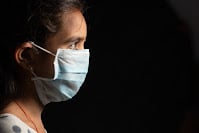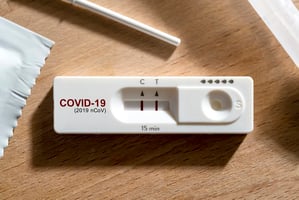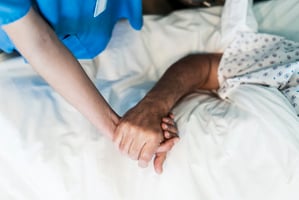Youth With Anxiety May Experience Worsening Symptoms After COVID-19

Youth with anxiety disorders who contract COVID-19 may experience worsening anxiety symptoms, suggests a small study reported in a letter in the Journal of the American Academy of Child & Adolescent Psychiatry.
Jeffrey R. Strawn, M.D., of the University of Cincinnati and colleagues analyzed data collected from a longitudinal study of adolescents aged 12 to 17 who had been diagnosed with primary anxiety disorders and were being treated with duloxetine or escitalopram. At the start of the study in December 2019, these youth participated in weekly follow-up visits, where they were evaluated using several measures, including the Generalized Anxiety Disorder-7 (GAD-7) and Clinical Global Impression-Severity (CGI-S) scales.
Strawn and colleagues focused their analysis on data obtained from 26 patients who were about 14 years old and had been evaluated weekly for 7 to 96 weeks. All patients met criteria for generalized anxiety disorder, 19% had separation anxiety disorder, 78% had social anxiety disorder, 30% had panic disorder, 26% had ADHD, and 37% had a history of a depressive disorder. All patients were treated with either duloxetine (30-120 mg/day) or escitalopram (5-20 mg/day) at the start of the study.
The researchers examined 1,308 weeks of data—including 1,019 patient-weeks from patients who did not contract COVID-19, 289 patient-weeks from patients with COVID-19 infection, and 139 patient-weeks post-COVID-19. All patients with COVID-19 were unvaccinated and experienced mild symptoms, the researchers noted.
The researchers found that post-COVID-19, patients’ anxiety symptoms were significantly worse on all GAD-7 subscales (including feelings of nervousness, irritability, and dread) and the CGI-S scale.
“Adolescents with more severe anxiety may experience greater or more severe long COVID symptoms or COVID-19–related worsening anxiety may potentiate long COVID symptoms,” Strawn and colleagues wrote. “Ultimately, understanding the neuropsychiatric effects of COVID-19 and long COVID … may inform novel treatments or optimization of existing interventions.”
For related information, see the Psychiatric News article “Psychological Stress May Not Be Only Route Of COVID-19’s Psychiatric Burden.”
(Image: iStock/lakshmiprasad S)
How Will End of PHE Impact You? Practice Management Helpline Wants to Know
The COVID-19 Public Health Emergency (PHE) will end on Thursday, May 11. APA wants to hear from you on how this change might affect your practice and your patients. Please email the Practice Management Helpline at practicemanagement@psych.org with a short description about how the requirement to have an in-person visit with a patient to prescribe controlled substances, the requirement to have a DEA license in any state in which you are prescribing controlled substances, and/or how the controlled substances shortages are affecting your practice. By sharing your story, we may use de-identified information in our advocacy efforts. Please let us know if you would be comfortable if we contacted you for more information.





